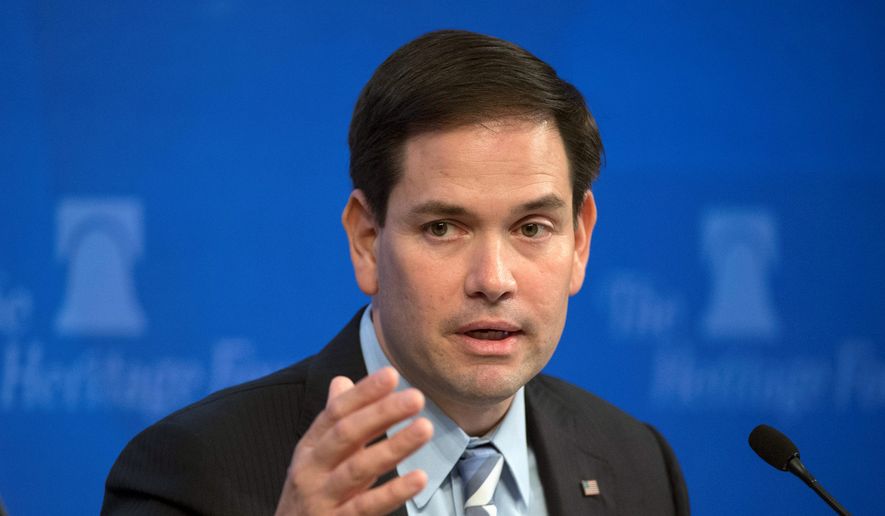Sen. Marco Rubio polished off his first week as a 2016 candidate Sunday by saying Iran could face war unless it abandons all hope of developing a nuclear bomb, offering a dose of tough talk days after congressional Democrats struck a deal with Republicans to give Congress a say over an emerging deal between the Islamic Republic and the White House.
The Florida Republican said the best way to thwart Iran is to leave unilateral and international sanctions in place.
“You combine that with a very clear demarcation to the Iranian regime. And that is this. If you cross this threshold, you will face military action on the part of the United States,” he told CBS’s “Face the Nation” program. “We don’t want that to happen. But the risk of a nuclear Iran is so great that that option must be on the table.”
The Senate Foreign Relations Committee cleared a calibrated approach to the ongoing negotiations last week, with Republicans and Democrats unanimously approving a bill that would force any Iran nuclear deal to be submitted to Congress.
Sen. Ben Cardin of Maryland, rejected any suggestion Sunday he undermined President Obama by working out the deal with Sen. Bob Corker, Tennessee Republican and the Foreign Relations chairman, after the White House earlier had threatened to veto such legislation.
“No, no, no, not at all,” Mr. Cardin told CNN’s “State of the Union.”
SEE ALSO: Michael McCaul: D.C. airspace vulnerable to small aircraft, drones
Under the Senate deal, the administration couldn’t lift any of the sanctions Congress has placed on Iran’s nuclear program until it presents all the details to Capitol Hill, and it gives lawmakers a chance to have a say.
Unless Congress votes to reject the deal — and a disciplined Democratic caucus can prevent that from happening — Mr. Obama then can waive all U.S. sanctions on his own.
The White House, which had earlier threatened vetoes of bills that might constrain the president, said Mr. Obama could accept the new restraints, saying it doesn’t think the bill would disrupt the negotiations midstream since it only gives Congress a crack once the president’s team finishes its work.
Lawmakers have said they aren’t prejudging the nuclear deal, which Mr. Obama’s team is still negotiating with Iran, racing a self-imposed end-of-June deadline to flesh out the details of the framework that all sides reached earlier this month.
“We are on path to have much more unity between Congress and the White House,” Mr. Cardin said. “I think the president is in a stronger position now to deliver the type of diplomatic solution that prevents Iran from becoming a nuclear weapons state.”
But Republicans have loudly insisted on having a role in the negotiations, citing mixed message from either side of the negotiations.
SEE ALSO: Bernie Sanders says he would seek victory, not just soap box, in presidential run
“The leadership in Iran is telling their citizens one thing. Our president and others are telling us another,” Mr. Corker told CNN.
Sen. Lindsey Graham, South Carolina Republican, was more direct, saying the president is heading down a dead-end road with Iran, as Capitol Hill moves to have a say in the pact.
“I think Barack Obama’s deal is deteriorating before our eyes,” he told “Fox News Sunday,” adding there’s not a “snowball’s chance” the current deal would earn Congress’ blessing.
Mr. Rubio, meanwhile, suggested Iran is an oil-rich country that does not seek uranium enrichment capability for energy, but rather military might.
“If we don’t do it, someone else will,” he said. “The Saudis are not going to sit there and watch Iran build a Shia bomb without a Sunni bomb.”
• Tom Howell Jr. can be reached at thowell@washingtontimes.com.




Please read our comment policy before commenting.